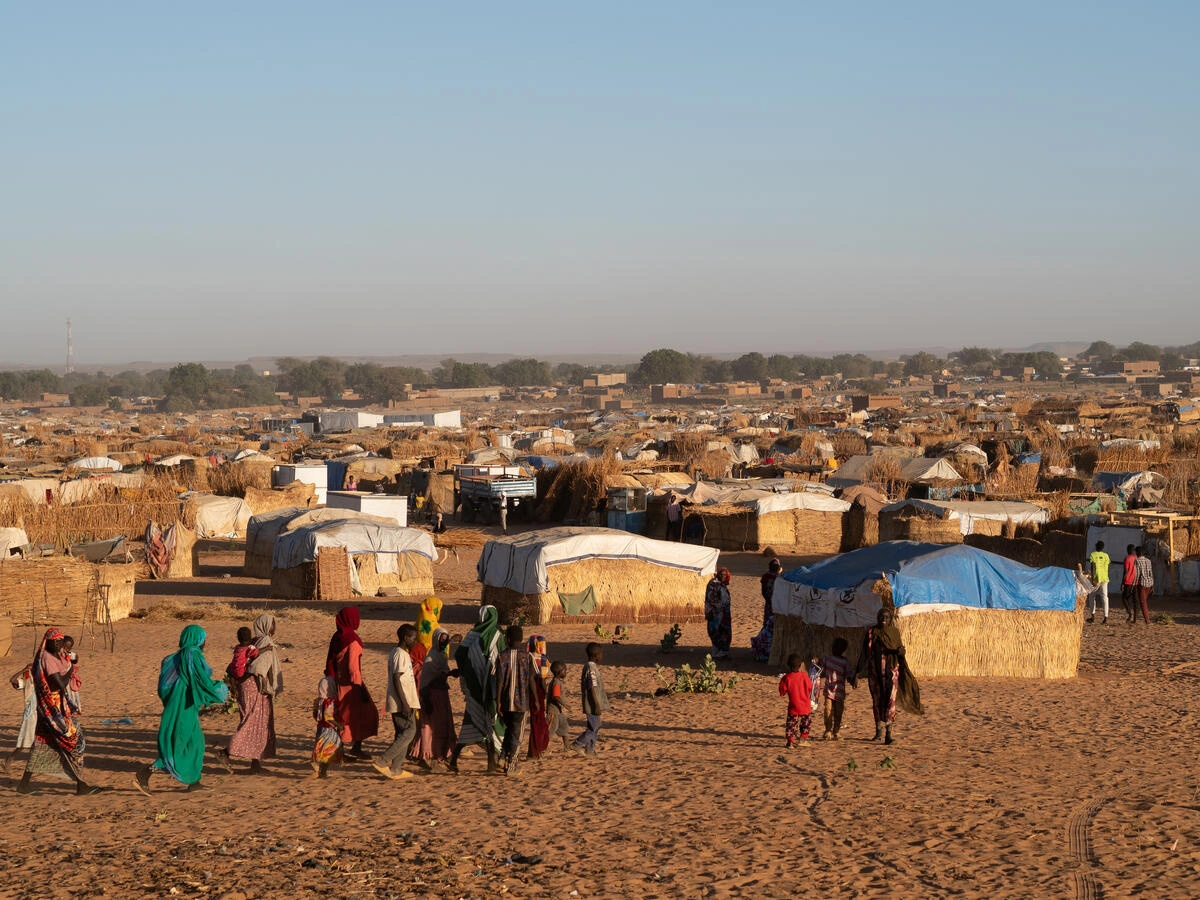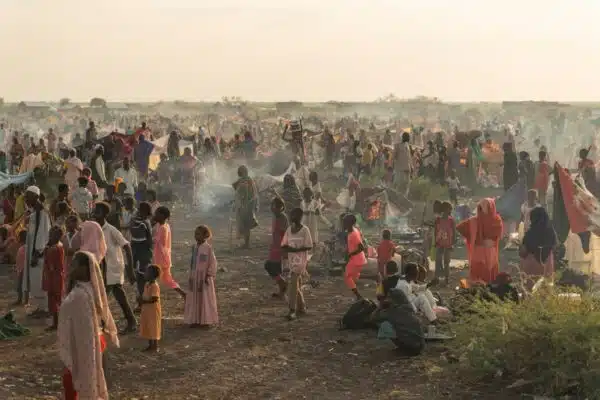
Hadjie Al Nour Sar (left) with her daughter Fatima at the Aboutengue refugee camp in eastern Chad. © UNHCR/Levon Sevunts
With over 600,000 new Sudanese refugees in Chad and more streaming in every day, underfunded humanitarian agencies are struggling to provide adequate assistance
By Levon Sevunts in Aboutengue refugee camp, Chad
Hadji Al Nour Sar has a simple wish: to change her clothes. The 30-year-old mother of six has worn the same tattered dress for over a year since she and her children escaped the fresh carnage in Sudan’s western Darfur region.
Nursing her youngest child, a six-month-old baby girl, in the welcome shade of a large tree in the Aboutengue refugee camp in eastern Chad, Hadji dreams of returning to her home in El Geneina, a city just a few dozen kilometres away, across the border to the east. “I miss our home, our food, my clothes,” Hadji said, rocking her infant daughter.
Since April 2023, the paramilitary Rapid Support Forces (RSF) has battled the Sudanese Armed Forces (SAF) for supremacy in a brutal civil war that has uprooted more than 9 million people. Nearly 2 million have fled to neighbouring countries, including Chad which has absorbed over 600,000 new Sudanese refugees. They have joined more than half a million others who fled to Chad during the previous bloody conflict in Darfur in 2003 and 2004.
Executions and beatings
For Fatima Adam Muhammad, a faded blood stain on a bullet-torn shawl is all that remains of her teenaged son, Mizamir, who was gunned down in front of her in El Geneina in June last year.

Fatima Adam Muhammad fled El Geneina in June 2023 after her teenage son was killed. She and her four surviving sons have found refuge at Aboutengue refugee camp in eastern Chad. © UNHCR/Levon Sevunts
Removing the shrapnel would require advanced medical imaging equipment and complicated surgery that is not available in the nearby field clinic run by Doctors Without Borders (Médecins Sans Frontières). Despite the discomfort and worry, Suraya is more worried about feeding her two children than getting the surgery she needs.
“I hope we’ll have enough food for the children, they are suffering a lot,” she said.
Race against the rain
Sudanese refugees initially arrive at spontaneous, informal settlements along the Chadian border where they may be safe from the immediate threat of violence but have extremely limited access to humanitarian support.
By early June, UNHCR, the UN Refugee Agency, and Chadian authorities had successfully relocated 60 per cent of these refugees to established camps, such as Aboutengue, where they have shelter and increased access to clean water and other basic services.
Funding, however, remains inadequate with UNHCR having received only 10 per cent of the $215 million it needs to respond to the situation in eastern Chad this year.
Other UN agencies and humanitarian organizations in Chad are also facing serious funding shortfalls. In November, the World Food programme (WFP) warned it may be forced to stop providing food assistance to 1.4 million crisis-affected populations in Chad due to funding constraints, even as food insecurity spirals.
The lack of funding is also affecting UNHCR’s ability to build new settlements and move people to them, even as the situation for the tens of thousands still living in countless informal sites near the border town of Adré becomes increasingly desperate. “These people are living on borrowed time,” said Benoit Kayembe Mukendi, a UNHCR field officer. “We need to help them to move to established camps before the rains come.”

Tens of thousands of Sudanese refugees are living in makeshift shelters at spontaneous refugee resettlements near the border town of Adré, Chad, with limited access to basic services. © UNHCR/Ying Hu
During the height of the rainy season in July and August torrential rains fill dry riverbeds with fast-flowing torrents of muddy water making travel difficult and some areas inaccessible. Adding to the urgency, said Benoit, many of the informal settlements are on seasonal agricultural land which increases the chances of tensions with host communities.
Continued threats
For some, living a stone’s throw from the border also comes with serious security risks. Jumaa Yagoub Suleiman, a 30-year-old community leader from Darfur, escaped the massacres in El Geneina last year, but even in Chad his life is constantly under threat from armed groups, and he is forced to change location regularly.
“It’s not safe here, they always contact us and send messages, they send people to Adré, searching for the community leaders. They tell me, ‘You escaped from El Geneina, but you’re not going to escape from Adré,’” Jumaa said.
While Jumaa hopes to be able to move further from the border soon, he also hopes the international community will not forget the people of Sudan.
“One day, we will be back home,” he said, “but not now. There is still too much suffering in my homeland, because of the war, because of the killings. One day, but not now.”
Originally published by UNHCR June 24 2024.





